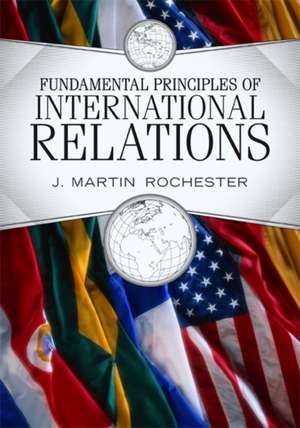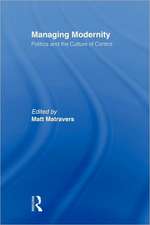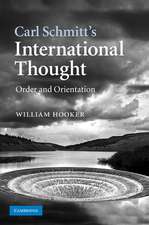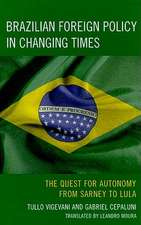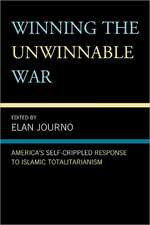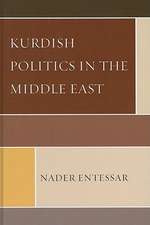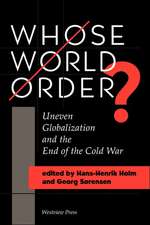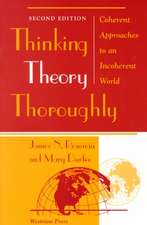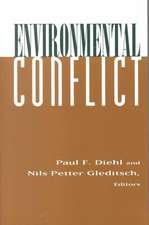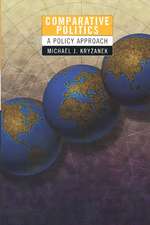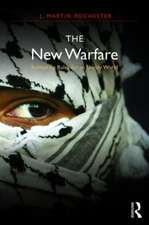Fundamental Principles of International Relations
Autor J. Martin Rochesteren Limba Engleză Paperback – 23 feb 2010
| Toate formatele și edițiile | Preț | Express |
|---|---|---|
| Paperback (1) | 518.01 lei 43-57 zile | |
| Taylor & Francis – 23 feb 2010 | 518.01 lei 43-57 zile | |
| Hardback (1) | 773.33 lei 43-57 zile | |
| Taylor & Francis – 13 iun 2019 | 773.33 lei 43-57 zile |
Preț: 518.01 lei
Preț vechi: 609.42 lei
-15% Nou
Puncte Express: 777
Preț estimativ în valută:
99.13€ • 103.11$ • 81.84£
99.13€ • 103.11$ • 81.84£
Carte tipărită la comandă
Livrare economică 14-28 aprilie
Preluare comenzi: 021 569.72.76
Specificații
ISBN-13: 9780813344188
ISBN-10: 0813344182
Pagini: 434
Ilustrații: black & white illustrations, maps
Dimensiuni: 152 x 229 x 25 mm
Greutate: 1.25 kg
Ediția:1
Editura: Taylor & Francis
Colecția Routledge
Locul publicării:Oxford, United Kingdom
ISBN-10: 0813344182
Pagini: 434
Ilustrații: black & white illustrations, maps
Dimensiuni: 152 x 229 x 25 mm
Greutate: 1.25 kg
Ediția:1
Editura: Taylor & Francis
Colecția Routledge
Locul publicării:Oxford, United Kingdom
Cuprins
Preface PART ONE Introduction: Conceptual and Historical Background 1 Understanding International Relations, or Getting a Handle on the World The Challenge Why Study International Relations? The Definition of International Relations The Paradigm Debate Scholars, Policymakers, and Citizens The Plan of the Book Questions for Study and Discussion Suggestions for Further Reading 2 The Historical Development of the International System: From the Birth of the Nation-State to Globalization The Birth of the Nation-State The International System in the Seventeenth, Eighteenth, and Nineteenth Centuries The International System in the Twentieth Century The Contemporary International System Conclusion Questions for Study and Discussion Suggestions for Further Reading PART TWO FOREIGN POLICY AND INTERNATIONAL POLITICS: The Dynamics of Conflict and Cooperation 3 States and Foreign Policy States as Players What Is Foreign Policy? The Analysis of Foreign Policy Explaining Foreign Policy: The "Levels of Analysis" Framework The International System Level The Nation-State Level The Individual Level Conclusion Questions for Study and Discussion Suggestions for Further Reading 4 Diplomacy, Bargaining, and Statecraft What Is Diplomacy? The Changing Nature of Diplomacy The Good Diplomat and Good Diplomacy: Rules to Follow in Negotiations Game Theory The Dynamics of Strategic Bargaining Conclusion Questions for Study and Discussion Suggestions for Further Reading 5 War and the Use of Armed Force Trends in the Use of Armed Force The Causes of War The Causes of Peace: Approaches to World Order Questions for Study and Discussion Suggestions for Further Reading 6 International Organization and Law International Organization The United Nations and the UN System The European Union International Law Conclusion Questions for Study and Discussion Suggestions for Further Reading PART THREE GLOBAL PROBLEM-SOLVING: Issue-Areas 7 Improving International Security The Problem Use of Force Regimes Arms Control Regimes Conclusion Questions for Study and Discussion Suggestions for Further Reading 8 Enhancing Human Rights and Human Development The Problem Human Rights Regimes Human Development Regimes Conclusion Questions for Study and Discussion Suggestions for Further Reading 9 Managing the World Economy and Promoting Prosperity The Problem International Economic Regimes Conclusion Questions for Study and Discussion Suggestions for Further Reading PART FOUR CONCLUSION: Thinking About the New Millennium 10 The Future of International Relations: Sovereignty, Global Governance, and the Human Prospect in the Twenty-first Century Whither the Nation-State System? Alternative World Order Models Living with Paradoxes: Toward a More Mature Anarchy Thinking About the Future Questions for Study and Discussion Suggestions for Further Reading Notes Glossary Index
Descriere
This book distills the essential elements of world politics, both the enduring characteristics as well as the revolutionary changes that may be altering the very fabric of the centuries-old state system. Rochester ultimately challenges the reader to think critically about the future of a post-Cold War and post-9/11 world.
